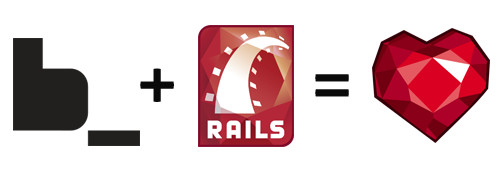Work with BEM methodology in Rails applications. BEM on Rails is ruby copy from bem-tools. You can read about bem-tools here and BEM methodology here.
Add this line to your application's Gemfile:
gem 'bem-on-rails'
And then execute:
$ bundle
Or install it yourself as:
$ gem install bem-on-rails
Then you should run install generator:
$ rails g bemonrails:install
This generator creates Thor task with templates. You should run to watch your new instruments:
$ thor -T
If you want use default level, you must be create folders tree for it:
$ thor bem:levels -a --default
You should restart server after install. You can customize everythink in initializers/bem.rb!
You can create blocks, elements, modificators and groups for blocks. It's awesome! Also you can remove them and watch lists of blocks, block elements, blocks mods and etc. Try thor help for more info.
Default blocks folder structure:
- bem
- level_name
- block_name
- elements
- __element_name
- __element_name.html.haml
- __element_name.css.sass
- __element_name.coffee
- __element_name.md
- __element_name
- mods
- _mod_name
- _mod_value
- _mod_name.css.sass
- _mod_name.coffee
- _mod_name.md
- _mod_name
- block_name.html.haml
- block_name.css.sass
- block_name.coffee
- block_name.md
- elements
- block_name
- level_name
You can specify all prefixes for blocks, elements and mods in bem.rb initializer.
All blocks now creates on levels.
Create new level:
$ thor bem:levels -a -n level_name
Get from git:
$ thor bem:levels -a -g [email protected]:verybigman/bem-controls.git
Copy from directory:
$ thor bem:levels -a -d ~/path/to/level_name
Easy block creating look like:
$ thor bem:create -b test
Block with mod:
$ thor bem:create -b test -m large
Block with pretty mod with value:
$ thor bem:create -b test -m color -v red
Create element:
$ thor bem:create -b test -e icon
Element with mod:
$ thor bem:create -b test -e icon -m large
Element with pretty mod:
$ thor bem:create -b test -e icon -m size -v small
Block in special technolody: $ thor bem:create -b test -T sass
Element in special tehcnology creates like block. List of know technologies you can see in bem.rb initializer. You can customize it. After block, element or mod creating generator adds to level assets (level_name/.bem/assets) main file (level) require string. Ex:
//= require ../../../../test/elements/__field/__field.css.sassYou should remember! You are not in any case should not be writing styles and scripts in assets levels and application files. Use them like configuration files, for require only. This involves using Sprockets.
In your view you should write this:
= b "test", mods: [{color: "red"}], content: [{ elem: "icon", elemMods: [{size: "small"}] }]If block in group:
= b "test", group: "name", mods: [{color: "red"}], content: []Block with mods without value:
= b "test", mods: [:super, {color: "red"}], content: []Block with custom attributes for tag:
= b "test", attrs: {src: "/img.png"}, content: []Block with custom class for tag:
= b "test", cls: "custom", content: []Block with custom tag for block( 'div' is default ):
= b "test", tag: "article", content: []Syntax is look like bemhtml.
Now templates exists for haml, sass, coffee and md technologies, but you will create your templates in lib/tasks/templates. For example, you can watch haml template:
- haml_tag this[:tag], this[:attrs]
= contentOr Slim template:
* this[:tag], this[:attrs]
= contentThis and content is BEM helpers for rendering. For access to default essence propeties use 'this' method. For access to custom essence properties use 'ctx' method.
You can use CSSO instead of YUI compressor for precompile assets. Read here about it.
If you want it, please watch here.
Stay BEMed!
- Incapsulate helpers methods and isolate them from project helpers.
- i-bem.js for html.
- deps.js
- Mods with restructure. Now you can't use mods with templates(haml, slim and etc.), but they generates.
- Fork it
- Create your feature branch (
git checkout -b my-new-feature) - Commit your changes (
git commit -am 'Add some feature') - Push to the branch (
git push origin my-new-feature) - Create new Pull Request

